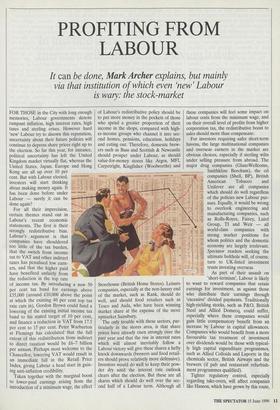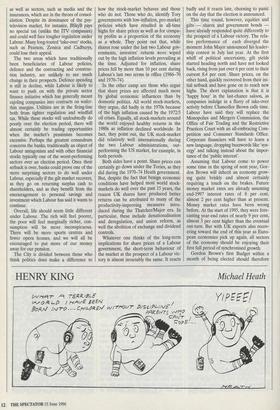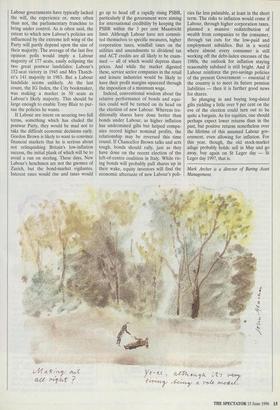PROFITING FROM LABOUR
via that institution of which even 'new' Labour is wary: the stock-market
FOR THOSE in the City with long enough memories, Labour governments denote rampant inflation, high interest rates, high taxes and sterling crises. However hard `new' Labour try to disown this reputation, uncertainty about their future policies will continue to depress share prices right up to the election. So far this year, for instance, political uncertainty has left the United Kingdom market virtually flat, whereas the United States, Japan, Europe and Hong Kong are all up over 10 per cent. But with Labour elected, investors will start thinking about making money again. It has been done before under Labour — surely ,it can be done again?
For all their imprecision, certain themes stand out in Labour's recent economic statements. The first is their strongly redistributive bias. Labour's argument is that companies have shouldered too little of the tax burden, that the switch from income tax to VAT and other indirect taxes has penalised low earn- ers, and that the higher paid have benefited unfairly from the reduction in the top rate of income tax. By introducing a new 50 per cent tax band for earnings above £35,000 (around £10,000 above the point at which the existing 40 per cent top tax rate cuts in), Gordon Brown could fund a lowering of the existing initial income tax band to his stated target of 10 per cent, and finance a reduction in VAT from 17.5 per cent to 15 per cent. Peter Warburton at Flemings has calculated that the full extent of this redistribution from indirect to direct taxation would be £6-7 billion per annum. Perhaps most welcome to the Chancellor, lowering VAT would result in an immediate fall in the Retail Price Index, giving Labour a head start in gain- ing anti-inflation credibility. Taken together with the marginal boost to lower-paid earnings arising from the introduction of a minimum wage, the effect of Labour's redistributive policy should be to put more money in the pockets of those who spend a greater proportion of their income in the shops, compared with high- er-income groups who channel it into sec- ond homes, pensions, education, holidays and eating out. Therefore, domestic brew- ers such as Bass and Scottish & Newcastle should prosper under Labour, as should value-for-money stores like Argos, MFI, Carpetright, Kingfisher (Woolworths) and Storehouse (British Home Stores). Leisure companies, especially at the non-luxury end of the market, such as Rank, should do well, and should food retailers such as Tesco and Asda, who have been winning market share at the expense of the more upmarket Sainsbury. The only trouble with these sectors, par- ticularly in the stores area, is that share prices have already risen strongly over the past year and that the rise in interest rates which will almost inevitably follow a Labour victory will give these shares a hefty knock downwards (brewers and food retail- ers should prove relatively more defensive). Investors would do well to keep their pow- der dry until the interest rate outlook clears after the election. But these are all shares which should do well over the sec- ond half of a Labour term. Although all these companies will feel some impact on labour costs from the minimum wage, and on their overall level of profits from higher corporation tax, the redistributive boost to sales should more than compensate.
For investors requiring safer short-term havens, the large multinational companies and overseas earners in the market are obvious choices, especially if sterling wilts under selling pressure from abroad. The major drug companies (GlaxoWellcome, Smithkline Beecham), the oil companies (Shell, BP), British American Tobacco and Unilever are all companies which should do well regardless of the policies new Labour pur- sues. Equally, it would be wrong to overlook engineering and manufacturing companies, such as Rolls-Royce, Fairey, Laird Group, TI and Weir — all world-class companies with strong market positions for whom politics and the domestic economy are largely irrelevant. Spectator readers seeking the ultimate bolthole will, of course, turn to UK-listed investment trusts investing overseas.
As part of their assault on `short-termism', Labour is likely to want to reward companies that retain earnings for investment, as against those who distribute their earnings through `excessive' divided payments. Traditionally high-yielding stocks, such as P&O, British Steel and Allied Domecq, could suffer, especially where these companies would gain little compensatory benefit from an increase by Labour in capital allowances. Companies who would benefit from a more favourable tax treatment of investment over dividends would be those with typical- ly high capital expenditure programmes, such as Allied Colloids and Laporte in the chemicals sector, British Airways and the brewers (if pub and restaurant refurbish- ment programmes qualified).
Tighter regulatory control, especially regarding take-overs, will affect companies like Hanson, which have grown by this route, as well as sectors, such as media and the insurances, which are in the throes of consol- idation. Despite its dominance of the pay- television market, for instance, BSkyB pays no special tax (unlike the ITV companies) and could well face tougher regulation under Labour. Many long-touted lake-over' stocks, such as Pearson, Zeneca and Cadburys, could lose their appeal.
The two areas which have traditionally been beneficiaries of Labour policies, defence and the contracting and construc- tion industry, are unlikely to see much change in their prospects. Defence spending is still in decline, while Labour is likely to want to push on with the private sector finance initiative which has generally meant cajoling companies into contracts on wafer- thin margins. Utilities are in the firing-line both from tighter regulation and windfall tax. While these stocks will undoubtedly do poorly over the election period, there will almost certainly be trading opportunities when the market's pessimism becomes excessive. Perhaps the greatest conundrum concerns the banks, traditionally an object of Labour antagonism and with other financial stocks typically one of the worst-performing sectors over an election period. Once their setback is over, banks could prove one of the more surprising sectors to do well under Labour, especially if the gilt market recovers, as they go on returning surplus cash to shareholders, and as they benefit from the encouragement to personal savings and investment which Labour has said it wants to continue.
Overall, life should seem little different under Labour. The rich will feel poorer, the poor will feel marginally richer, con- sumption will be more inconspicuous. There will be more sports centres and fewer opera houses, and we will all be encouraged to put more of our money away for our pension.
The City is divided between those who think politics does make a difference to how the stock-market behaves and those who do not. Those who do, identify Tory governments with low-inflation, pro-market policies which have resulted in all-time highs for share prices as well as for compa- ny profits as a proportion of the economy as a whole. They point out that, while shares rose under the last two Labour gov- ernments, investors' returns were wiped out by the high inflation levels prevailing at the time. Adjusted for inflation, share prices fell by more than 10 per cent during Labour's last two terms in office (1966-70 and 1970-74).
In the other camp are those who argue that share prices are affected much more by global economic influences than by domestic politics. All world stock-markets, they argue, did badly in the 1970s because of the high inflation caused by the 1972/3 oil crises. Equally, all stock-markets around the world enjoyed healthy returns in the 1980s as inflation declined worldwide. In fact, they point out, the UK stock-market did relatively well internationally during the two Labour administrations, out- performing the US market, for example, in both periods.
Both sides have a point. Share prices can certainly go down under the Tories, as they did during the 1970-74 Heath government. But, despite the fact that benign economic conditions have helped most world stock- markets do well over the past 15 years, the reason UK shares have produced better returns can be attributed to many of the productivity-improving measures intro- duced during the Thatcher/Major era. In particular, these include denationalisation and deregulation, and union reform, as well the abolition of exchange and dividend controls.
Whatever one thinks of the long-term implications for share prices of a Labour government, the short-term behaviour of the market at the prospect of a Labour vic- tory is almost invariably the same. It reacts badly and it reacts late, choosing to panic on the day that the election is announced.
This time round, however, equities and gilts — shares and government bonds have already responded quite differently to the prospect of a Labour victory. The rela- tive performance of each diverged the moment John Major announced his leader- ship contest in July last year. At the first whiff of political uncertainty, gilt yields started heading north and have not looked back, rising from just over 6 per cent to their current 8.4 per cent. Share prices, on the other hand, quickly recovered from their ini- tial setback and have gone on to reach new highs. The short explanation is that it is `happy hour' in the last-chance saloon, as companies indulge in a flurry of take-over activity before Chancellor Brown calls time. Labour have said they will replace the Monopolies and Mergers Commission, the Office of Fair Trading and the Restrictive Practices Court with an all-embracing Com- petition and Consumer Standards Office. Corporate financiers will have to learn a new language, dropping buzzwords like 'syn- ergy' and talking instead about the impor- tance of the 'public interest'.
Assuming that Labour come to power some time in the spring of next year, Gor- don Brown will inherit an economy grow- ing quite briskly and almost certainly requiring a touch on the brakes. Future money market rates are already assuming end-1997 interest rates of 8 per cent, almost 2 per cent higher than at present. Money market rates have been wrong before. At the start of 1995, they were fore- casting year-end rates of nearly 9 per cent, almost 3 per cent higher than the eventual out-turn. But with UK exports also recov- ering toward the end of this year as Euro- pean economies pick up again, all sectors of the economy should be enjoying their first full period of synchronised growth.
Gordon Brown's first Budget within a month of being elected should therefore prove one of the most interesting for sever- al years. And if investors in the UK equity market were looking for a final reason to feel miserable, then this is it. Far from endorsing the Labour Party's reputation for fiscal profligacy — which has generally provided quite a fillip to share prices until higher inflation has eroded their gains Chancellor Brown's first Budget is likely to be tough. Successive Tory chancellors, from Reggie Maudling through to Francis Barber, have been adept at engineering runaway economies which incoming Labour governments have typically lacked the will, the experience or, more often than not, the parliamentary franchise to bring under control. As is often said, the extent to which new Labour's policies are influenced by the extreme left wing of the Party will partly depend upon the size of their majority. The average of the last five opinion polls would imply a Labour majority of 177 seats, easily eclipsing the two great postwar landslides: Labour's 152-seat victory in 1945 and Mrs Thatch- er's 141 majority in 1983. But a Labour landslide seems unlikely. At the last count, the IG Index, the City bookmaker, was making a market in 50 seats as Labour's likely majority. This should be large enough to enable Tony Blair to pur- sue the policies he wants.
If Labour are intent on securing two full terms, something which has eluded the postwar Party, they would be mad not to take the difficult economic decisions early. Gordon Brown is likely to want to convince financial markets that he is serious about not relinquishing Britain's low-inflation success, the initial plank of which will be to avoid a run on sterling. These days, New Labour's henchmen are not the gnomes of Zurich, but the bond-market vigilantes. Interest rates would rise and taxes would go up to head off a rapidly rising PSBR, particularly if the government were aiming for international credibility by keeping the PSBR within the 3 per cent Maastricht limit. Although Labour have not commit- ted themselves to specific measures, higher corporation taxes, windfall taxes on the utilities and amendments to dividend tax and ACT credits are all likely to be exam- ined — all of which would depress share prices. And while the market digested these, service sector companies in the retail and leisure industries would be likely to have their profit margins squeezed through the imposition of a minimum wage.
Indeed, conventional wisdom about the relative performance of bonds and equi- ties could well be turned on its head on the election of new Labour. Whereas tra- ditionally shares have done better than bonds under Labour, as higher inflation has undermined gilts but helped compa- nies record higher nominal profits, the relationship may be reversed this time round. If Chancellor Brown talks and acts tough, bonds should rally, just as they have done on the recent election of the left-of-centre coalition in Italy. While ris- ing bonds will probably pull shares up in their wake, equity investors will find the economic aftertaste of new Labour's poli- cies far less palatable, at least in the short term. The risks to inflation would come if Labour, through higher corporation taxes, planned a massive redistribution of wealth from companies to the consumer, through tax cuts for the low-paid and employment subsidies. But in a world where almost every consumer is still working off the debt-laden excesses of the 1980s, the outlook for inflation staying reasonably subdued is still bright. And if Labour reinforce the pro-savings policies of the present Government — essential if the country is to meet its future pension liabilities — then it is further good news for shares.
So plunging in and buying long-dated gilts yielding a little over 9 per cent on the eve of the election could turn out to be quite a bargain. As for equities, one should perhaps expect lower returns than in the past, but positive returns nonetheless over the lifetime of this assumed Labour gov- ernment, even allowing for inflation. For this year, though, the old stock-market adage probably holds: sell in May and go away, buy again on St Leger day — St Leger day 1997, that is.
Mark Archer is a director of Baring Asset Management.





































































 Previous page
Previous page